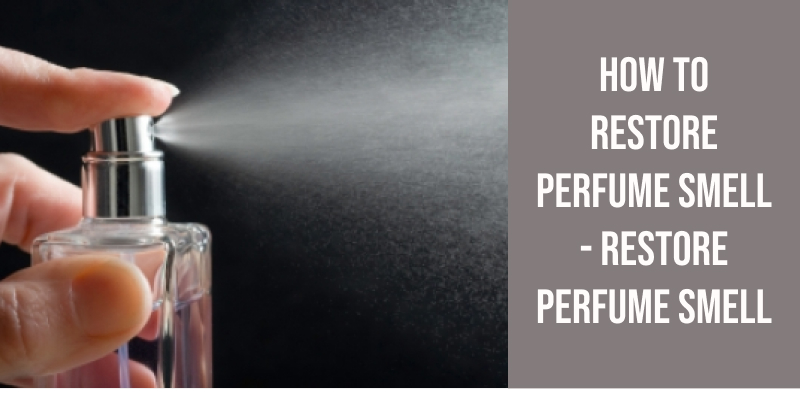Restoring the smell of perfume primarily involves maintaining optimal storage conditions. Keep your perfume in a cool and dry place, away from light because direct sunlight and heat can break down the essential oils and alter the fragrance. Always remember to replace the cap tightly after each use to prevent the fragrance from evaporating. If your perfume comes in a clear bottle, consider putting it in a box or wrapping it with light-blocking materials to protect it from light. Avoid shaking your perfume bottle because this might let in air that can degrade the scent over time. To rejuvenate the scent, you can combine the remnants of the perfume with unscented lotion or oil. Or add a drop or two of essential oil that matches or complements the original scent. Make sure not to mix different perfumes because it could result in an undesirable scent. For proper maintenance, be consistent in using your perfume regularly, because once opened, the quality starts deteriorating after a year or so, irrespective of how it’s preserved.

How Do You Revive Old Perfume?
Store it properly: Perfumes should be stored in a cool, dark place away from direct sunlight and extreme temperature fluctuations. Exposure to heat, light, and air can degrade the fragrance over time. Make sure your perfume is tightly sealed to prevent unnecessary evaporation.
Shake the bottle: Some fragrances, especially those with a higher concentration of oils, may have settled or separated over time. Give the bottle a gentle shake to mix the ingredients and distribute the fragrance molecules more evenly.
Check for expiration: Perfumes do have a shelf life, typically ranging from 3 to 5 years. If your perfume is past its expiration date, it may have degraded, resulting in a weaker scent. Check the packaging or contact the manufacturer to determine the recommended shelf life for your specific perfume.
Keep it away from contaminants: Perfumes can be affected by exposure to contaminants such as dust, moisture, or other strong-smelling substances. Ensure your perfume is not stored near cleaning agents, strong-smelling lotions, or other products that may interfere with its scent.
Apply it to appropriate pulse points: When applying perfume, focus on pulse points such as the wrists, neck, or inside of the elbows. These areas generate heat, which can help activate and release the fragrance more effectively.
Layer it with complementary products: To enhance the scent and longevity of your perfume, consider using matching or complementary scented products such as body lotions, shower gels, or moisturizers from the same fragrance line. Layering products can help intensify the fragrance and make it last longer on the skin.
Seek professional advice: If you have tried the above steps and the scent is still weak or missing, you may consider reaching out to the perfume’s manufacturer or a professional perfumer for guidance. They may have specific recommendations or solutions based on the formulation of the fragrance.
It’s important to note that while these steps may help improve the fragrance’s scent, they are not guaranteed to fully restore it to its original intensity. Perfumes can change over time, and some natural ingredients may naturally degrade, leading to alterations in the scent.
Why Has My Perfume Lost Its Smell?
Perfumes have a shelf life, and their longevity depends on various factors such as the formulation, storage conditions, and quality of ingredients. It’s essential to check the expiration date of a perfume and recognize that fragrances do have a natural lifespan.
If you find that a perfume has lost its scent or has a noticeably different smell, it is likely best to accept that it has reached the end of its useful life and consider replacing it with a fresh bottle or exploring new fragrances.
Can You Store Perfume in The Fridge?
Storing perfume in the fridge is generally not recommended and may not have a significant impact on preserving or restoring the fragrance. Perfumes are sensitive to extreme temperature fluctuations, and refrigeration can introduce moisture and alter the chemical composition of the fragrance, potentially compromising its quality.
Perfumes are best stored in a cool, dry place away from direct sunlight and heat sources. Exposing them to excessive cold temperatures in the fridge can cause the fragrance to become cloudy, separate, or even spoil. The temperature fluctuations that occur when removing the perfume from the fridge and allowing it to warm up again can also affect the scent and potentially lead to the breakdown of fragrance components.
It’s important to note that perfume manufacturers typically recommend storing fragrances at room temperature, as this helps maintain the stability and integrity of the fragrance over time. If you want to preserve your perfume, find a cool and dark area in your home that maintains a consistent temperature, such as a drawer or a cupboard.
Can I Keep Perfume for Years?
The shelf life of a perfume depends on a variety of factors, including the type of perfume, the ingredients used, and how it’s stored. Natural perfumes, which are made with essential oils, tend to have shorter shelf life than synthetic perfumes, which are made with synthetic fragrances. Natural perfumes are also more sensitive to light and heat, so they should be stored in a cool, dark place.
Heat and light can cause perfume to break down and lose its scent. It’s also important to keep the bottle tightly sealed when not in use, as air can cause the perfume to evaporate and lose its scent. Additionally, perfumes shouldn’t be stored in bathroom, as humidity can cause perfume to break down.
Generally, perfumes with heavier base notes will last longer than those with lighter, more delicate fruity or citrus notes. With proper storage and care, most perfumes can last three to five years.
Do Fragrances Last Longer in Winter or Summer – Compare Fragrance Longevity
When the temperature is lower, the evaporation of a perfume is slower and less diffusive. This means that scent of perfume will linger on skin for longer period of time in cold weather. However, this also means that the scent will be less diffusive, making it harder to smell. This is because molecules of perfume aren’t able to evaporate as quickly in cold air, resulting in weaker scent.
Remy Parisi-Pettier, perfumer and fragrance director at Givaudan, explains that this is due to the fact that the molecules of the perfume are heavier and denser in cold weather. This makes it more difficult for them to evaporate and disperse in air, resulting in weaker scent.
Conclusion
By following proper storage guidelines, such as avoiding extreme temperatures and keeping the perfume away from direct sunlight and moisture, you can help prolong the lifespan and quality of your fragrance.





